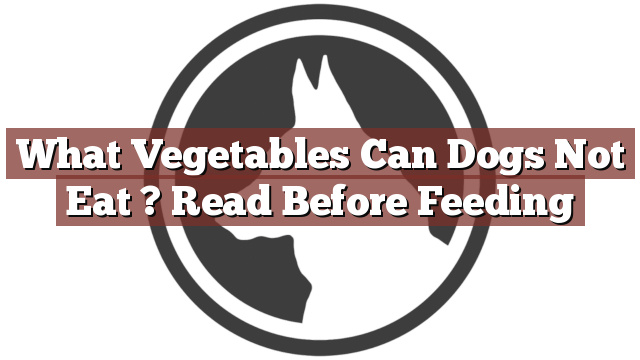Understanding Your Dog’s Dietary Needs
As a responsible dog owner, it is crucial to understand your furry friend’s dietary needs. While dogs are primarily carnivorous, they can also benefit from consuming certain vegetables. Vegetables can provide essential vitamins, minerals, and fiber to your dog’s diet. However, it is essential to be aware that not all vegetables are safe for dogs to eat. Some vegetables can be harmful and even toxic to them. Therefore, it is crucial to familiarize yourself with the vegetables that are safe and those that should be avoided when it comes to feeding your dog a vegetable-based diet.
What Vegetables Can Dogs Not Eat? Read Before Feeding
Feeding vegetables to your dog can be a healthy addition to their diet, but it is important to be cautious about the vegetables you choose. Here are some vegetables that dogs should not eat:
-
Onions and Garlic: Onions and garlic can cause damage to a dog’s red blood cells, leading to anemia. This means that foods like onion powder or garlic powder should also be avoided.
-
Grapes and Raisins: Grapes and raisins can be extremely toxic to dogs, leading to kidney failure. Even a small amount can be harmful.
-
Avocado: Avocados contain a substance called persin, which can be toxic to dogs. It can lead to vomiting, diarrhea, and even pancreatitis.
-
Mushrooms: While some mushrooms are safe for dogs to eat, several varieties of wild mushrooms can be highly toxic. It is better to avoid feeding any mushrooms unless you are absolutely sure they are safe.
-
Tomatoes: The green parts of tomatoes, including the stems and leaves, contain solanine, which can be toxic to dogs. While ripe tomatoes in small amounts are generally safe, it is best to avoid feeding the green parts.
Pros and Cons of Feeding Vegetables to Dogs
Feeding vegetables to dogs can have both pros and cons. Here are some points to consider:
Pros:
- Vegetables can provide dogs with added vitamins, minerals, and fiber.
- Some vegetables can help with weight management and promote a healthy digestive system.
- Offering a variety of vegetables can add taste and texture to your dog’s diet, making mealtimes more enjoyable for them.
Cons:
- Some vegetables can be harmful or toxic to dogs, as mentioned above.
- Dogs have different digestive systems than humans, so certain vegetables may cause gastrointestinal issues like gas or upset stomachs.
- Dogs need a balanced diet that includes mainly meat, so vegetables should always be given in moderation and as a supplement to their normal diet.
Conclusion: Making Informed Decisions for Your Dog’s Health
In conclusion, it is important to be aware of the vegetables that can be harmful or toxic to dogs. While some vegetables can provide health benefits when added to a dog’s diet, it is crucial to do thorough research and consult with your veterinarian before introducing new foods. Can a dog eat vegetables? Yes, but only certain ones and in moderation. By making informed decisions about your dog’s diet, you can ensure their overall health and well-being. Remember, a balanced diet that meets their nutritional needs should always be the top priority when it comes to feeding your furry companion.
Thank you for taking the time to read through our exploration of [page_title]. As every dog lover knows, our furry friends have unique dietary needs and responses, often varying from one canine to another. This is why it's paramount to approach any changes in their diet with caution and knowledge.
Before introducing any new treats or making alterations to your dog's diet based on our insights, it's crucial to consult with a veterinarian about [page_title]. Their expertise ensures that the choices you make are well-suited to your particular pet's health and well-being.
Even seemingly harmless foods can sometimes lead to allergic reactions or digestive issues, which is why monitoring your dog after introducing any new food item is essential.
The content provided here on [page_title] is crafted with care, thorough research, and a genuine love for dogs. Nevertheless, it serves as a general guideline and should not be considered a substitute for professional veterinary advice.
Always prioritize the expert insights of your veterinarian, and remember that the health and happiness of your furry companion come first.
May your journey with your pet continue to be filled with joy, love, and safe culinary adventures. Happy reading, and even happier snacking for your canine friend!

